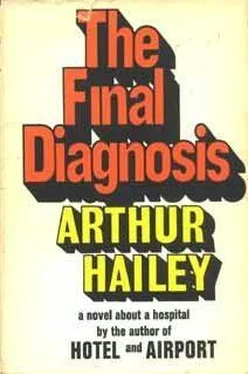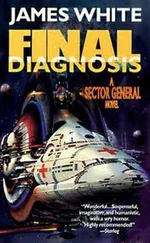Arthur Hailey - The Final Diagnosis
Здесь есть возможность читать онлайн «Arthur Hailey - The Final Diagnosis» весь текст электронной книги совершенно бесплатно (целиком полную версию без сокращений). В некоторых случаях можно слушать аудио, скачать через торрент в формате fb2 и присутствует краткое содержание. Жанр: Триллер, на английском языке. Описание произведения, (предисловие) а так же отзывы посетителей доступны на портале библиотеки ЛибКат.
- Название:The Final Diagnosis
- Автор:
- Жанр:
- Год:неизвестен
- ISBN:нет данных
- Рейтинг книги:4 / 5. Голосов: 1
-
Избранное:Добавить в избранное
- Отзывы:
-
Ваша оценка:
- 80
- 1
- 2
- 3
- 4
- 5
The Final Diagnosis: краткое содержание, описание и аннотация
Предлагаем к чтению аннотацию, описание, краткое содержание или предисловие (зависит от того, что написал сам автор книги «The Final Diagnosis»). Если вы не нашли необходимую информацию о книге — напишите в комментариях, мы постараемся отыскать её.
The Final Diagnosis — читать онлайн бесплатно полную книгу (весь текст) целиком
Ниже представлен текст книги, разбитый по страницам. Система сохранения места последней прочитанной страницы, позволяет с удобством читать онлайн бесплатно книгу «The Final Diagnosis», без необходимости каждый раз заново искать на чём Вы остановились. Поставьте закладку, и сможете в любой момент перейти на страницу, на которой закончили чтение.
Интервал:
Закладка:
It was just this situation which had made him thoughtful after talking with Bill Rufus. The pathology department at Three Counties was still a stronghold of the old regime. Dr. Joseph Pearson, who ran it like a personal possession, had been thirty-two years at the hospital. He knew most of the old board members intimately and was a frequent chess companion of Eustace Swayne. More to the point, Joe Pearson was no incompetent; his record was good. In his earlier days he had been recognized as an active researcher, and he was a past president of the State Pathology Association. The real problem was that the work in Pathology had become too much for one man to keep the reins in his own hands. O’Donnell suspected, too, that some of the pathology department’s lab procedures were in need of overhauling. But desirable as changes might be, this one was going to be tough.
There was the drive for funds for the hospital extension to be considered. If there were trouble between O’Donnell and Joe Pearson, how would Pearson’s influence with Eustace Swayne affect Orden Brown’s plans for raising all the money by fall next year? Swayne’s own donation would normally be a big one, and loss of that alone could be serious. But equally serious was Swayne’s influence with other people in the town; in some ways the old tycoon possessed the power to make or mar their immediate plans.
With so many things pending O’Donnell had hoped the problem of Pathology could be left for a while. Nevertheless he had to take some action, and soon, about Bill Rufus’ complaint.
He turned away from the plans. “Harry,” he said to the administrator, “I think we may have to go to war with Joe Pearson.”
Three
In contrast with the heat and activity of the floors above, in the white-tiled corridor of the hospital’s basement it was quiet and cool. Nor was the quietness disturbed by a small procession—Nurse Penfield, and alongside her a stretcher gliding silently on ball-bearing casters and propelled by a male orderly wearing rubber-soled shoes below his hospital whites.
How many times had she made this journey, Nurse Penfield speculated, glancing down at the shrouded figure on the stretcher. Probably fifty times in the past eleven years. Perhaps more, because it was not something you kept score of—this final journey between the ward and the hospital’s morgue, between the territory of the living and the dead.
A tradition, this last walk with a patient who had died, discreetly timed and routed through back corridors of the hospital, then downward in the freight elevator, so that the living should take no darkness or depression from death so close at hand. It was the last service from nurse to her charge, an acknowledgment that, though medicine had failed, it would not dismiss the patient summarily; the motions of care, service, healing, would continue for at least a token time beyond the end.
The white corridor forked two ways here. From a passage to the right came the hum of machinery. Down there were the hospital’s mechanical departments—heating plant, hot-water systems, electrical shops, emergency generators. Pointing the other way, a single sign read: “Pathology Department. Morgue.”
As Weidman, the male orderly, swung the stretcher left, a janitor—either on work break or stolen time—lowered the Coke he had been drinking and moved aside. He wiped his lips on the back of his hand, then gestured to the shroud. “Didn’t make it, eh?” The remark was to Weidman; it was an amiable gambit, a game played many times.
Weidman, too, had done this before. “I guess they pulled his number, Jack.”
The janitor nodded, then raised his Coke bottle again and drank deeply.
How short a time, Nurse Penfield thought, between life and the autopsy room. Less than an hour ago the body under the shroud had been George Andrew Dunton, living, age fifty-three, civil engineer. She remembered the details from the case history on the clip board under her arm.
The family had behaved as well after the death as they had before—solid, emotional, but no hysterics. It had made it easier for Dr. MacMahon to ask for permission to autopsy. “Mrs. Dunton,” he had said quietly, “I know it’s hard for you to talk and think about this now, but there is something I have to ask. It’s about permission for an autopsy on your husband.”
He had gone on, using the routine words, how the hospital sought to safeguard its medical standards for the good of everyone, how a physician’s diagnosis could be checked and medical learning advanced, how this was a precaution for the family and others who would use the hospital in time to come. But none of this could be done without permission . . .
The son had stopped him and said gently, “We understand. If you make out whatever is necessary, my mother will sign it.”
So Nurse Penfield had made out the autopsy form, and here now was George Andrew Dunton, dead, age fifty-three, and ready for the pathologist’s knife.
The autopsy-room doors swung open.
George Rinne, the pathology department’s Negro diener—keeper of the morgue—looked up as the stretcher rolled in. He had been swabbing the autopsy table. Now it shone spotlessly white.
Weidman greeted him with the timeworn jest. “Got a patient for you.”
Politely, as if he hadn’t heard the line a hundred times before, Rinne bared his teeth in a perfunctory smile. He indicated the white enameled table. “Over here.”
Weidman maneuvered the stretcher alongside, and Rinne removed the sheet covering the naked corpse of George Andrew Dunton. He folded it neatly and handed it back to Weidman. Death notwithstanding, the sheet would have to be accounted for back in the ward. Now, with a second drawsheet under the torso, the two men slid the body onto the table.
George Rinne grunted as he took the weight. This had been a heavy man, a six-footer who had run to fat near the end of his life. As he wheeled the stretcher clear Weidman grinned. “You’re getting old, George. Be your turn soon.”
Rinne shook his head. “I’ll still be here to lift you on the table.”
The scene ran smoothly. It had had many performances. Perhaps in the distant past the two had made their grim little jokes with an instinct to create some barrier between themselves and the death they lived with daily. But if so this was long forgotten. Now it was a patter to be run through, a formality expected, nothing more. They had grown too used to death to feel uneasiness or fear.
On the far side of the autopsy room was the pathology resident, Dr. McNeil. He had been shrugging into a white coat when Nurse Penfield and her charge came in. Now, glancing through the case history and the other papers she had handed him, he was acutely conscious of Nurse Penfield’s nearness and warmth. He sensed the crisp starched uniform, a faint breath of perfume, a slight disarrangement of hair beneath her cap; it would be soft to run his fingers through. He snatched his thoughts back to the papers in hand.
“Well, everything seems to be here.”
Should he try for Nurse Penfield or not? It had been six weeks now, and at the age of twenty-seven six weeks was a long time to be celibate. Penfield was more than averagely attractive, probably thirty-two, young enough to be interesting, old enough to have long since shed innocency. She was intelligent, friendly; good figure too. He could see a slip beneath the white uniform; in the heat she probably was not wearing much else. Roger McNeil calculated. He would probably have to take her out a couple of times before she came through. Then that settled it; it couldn’t be this month—money was too short. Save it for me, la Penfield. You’ll be back; other patients will die and bring you here.
“Thank you, Doctor.” She smiled and turned away. It could be arranged; he was positive of that.
Читать дальшеИнтервал:
Закладка:
Похожие книги на «The Final Diagnosis»
Представляем Вашему вниманию похожие книги на «The Final Diagnosis» списком для выбора. Мы отобрали схожую по названию и смыслу литературу в надежде предоставить читателям больше вариантов отыскать новые, интересные, ещё непрочитанные произведения.
Обсуждение, отзывы о книге «The Final Diagnosis» и просто собственные мнения читателей. Оставьте ваши комментарии, напишите, что Вы думаете о произведении, его смысле или главных героях. Укажите что конкретно понравилось, а что нет, и почему Вы так считаете.












